2022 年山东聊城中考英语试题及答案
亲爱的同学,伴随着考试的开始,你又走到了一个人生驿站。请你在答题之前,一定要仔
细阅读以下说明:
1.试题由选择题与非选择题两部分组成,共 10 页。选择题 80 分,非选择题 40 分,共计 120
分。考试时间 120 分钟。
2.将姓名、考场号、座号、考号填写在试题和答题卡指定的位置。
3.试题答案全部涂、写在答题卡上,完全按照答题卡中的“注意事项”答题。
4.考试结束后,答题卡和试题一并交回。愿你放松心情,放飞思维,充分发挥,争取交一
份圆满答卷。
选择题(三大题,共计 80 分)
一、听力测试(共 30 小题;每小题 1 分,满分 30 分)
第一节 听下面 10 个小对话。每个对话后面有一个小题,从题中所给的 A、B、C 三个选项
中选出最佳选项,并标在试卷的相应位置。听完每个对话后,你都有 10 秒钟的时间来回答
有关小题和阅读下一小题。每个对话仅读一遍。
1. What does the man want to buy?
A. A pair of shoes.
B. A pair of trousers.
C. A pair of gloves.
2. What does Peter want to be in the future?
A. An engineer.
B. A scientist.
C. A policeman.
3. What’s the weather like now?
A. Rainy.
B. Sunny.
C. Windy.
4. How many subjects are mentioned in the conversation?
A. Two.
B. Three.
C. Four.
5. How will the speakers probably go to the airport?
A. By bus.
B. By air.
C. By car.
6. Where does the woman want to go?
A. To the theatre.
B. To the bank.
C. To the cinema.
7. What does Mary want?
A. Some water.
B. Some cakes.
C. Some fruit.
8. What’s the probable relationship between the speakers?
A. Teacher and student.
B. Grandma and grandson. C. Mother and son.
9. Who may know Jane’s date of birth?
A. The man.
B. Lisa.
C. The woman.
10. When will Mike come back?
�
A. On 2nd July.
B. On 3rd July.
C. On 5th July.
第二节 听下面四段对话。每段对话后各有几个小题,从题中所给的 A、B、C 三个选项中选
出最佳选项,并标在试卷的相应位置。听每段对话前,你有时间阅读各个小题,每小题 5
秒钟;听完后,各小题将给出 5 秒钟的作答时间。每段对话读两遍。
听下面一段对话,回答第 11 至 13 题。
11. What was Jenny doing at 5 yesterday afternoon?
A. Going home.
B. Playing basketball.
C. Going to the hospital.
12. Who sent Jenny to the hospital?
A. Clare.
B. Jenny’s parents.
C. Mike.
13. What does Mike want to buy?
A. A hat.
B. A basket.
C. A bike.
听下面一段对话,回答第 14 至 17 题。
14. What are the speakers mainly talking about?
A. School life.
B. Weekend plans.
C. Personal hobbies.
15. What will Bob do first on Saturday morning?
A. Practise painting.
B. Check his email.
C. Do his homework.
16. What will Betty do on Saturday afternoon?
A. Go to a concert.
B. Have a picnic.
C. Have a piano lesson.
17. Where will the speakers and Lucy meet?
A. In the park.
B. Near the beach.
C. At the school.
听下面一段对话,回答第 18 至 21 题。
18. What is the conversation mainly about?
A. What Jack’s parents do.
B. How Jack made friends.
C. How Jack studies in Beijing.
19. With whom did Jack come to Beijing?
A. His teachers.
B. His friends.
C. His parents.
20. What can we know about Wang Ning?
A. He is short.
B. He often plays volleyball. C. He likes collecting stamps.
21. When did Jack and Wang Ning become friends?
A. In the spring.
B. In the summer.
C. In the autumn.
听下面一段对话,回答第 22 至 25 题。
22. Where was the conversation taking place?
A. On the boat.
B. On the phone.
C. In the city center of Guilin.
�
23. How large is Yangshuo?
A. About 65 square kilometres.
B. About 1,418 square kilometres.
C. About 1,428 square kilometres.
24. How many kinds of things is Yangshuo famous for?
A. Two.
B. Three.
C. Four.
25. What will Amy show to Henry?
A. Some rocks.
B. Some photos.
C. Some gifts.
第三节 听下面一段独白。独白后有 5 个小题,从题中所给的 A、B、C 三个选项中选出最佳
选项,并标在试卷的相应位置。听独白前,你有时间阅读各个小题,每小题 5 秒钟;听完后,
每小题将给出 5 秒钟的作答时间。该段独白读两遍。
26. How long did Lao She stay at the teacher's school?
A. For 4 years.
B. For 5 years.
C. For 6 years.
27. Where did Lao She work as a head teacher?
A. At a primary school.
B. At a middle school.
C. At a college.
28. What did Lao She do in London?
A. Acted plays.
B. Wrote novels.
C. Taught Chinese.
29. When did Lao She return to China?
A. In 1918.
B. In 1924.
C. In 1929.
30. What can we know about Teahouse?
A. It has thirteen acts.
B. It was written in 1957.
C. It is about Wang Lifa’s family life.
二、完形填空(共 10 小题;每小题 1 分,满分 10 分)
阅读下面短文,掌握其大意,然后从短文后各题所给的 A、B、C 三个选项中,选出可以填入
空白处的最佳选项,并在答题卡上将该项涂黑。
In 1998, when the volunteer(志愿者) teacher Han Mei first entered the small
mountain village school, she couldn’t believe her eyes. She was
31
to see the
sights (情景) in front of her: broken windows, small old desks and chairs. Even
32
, students of different ages were in the same classroom. It was the only class
in the school. Han Mei
33
how poor the local people were in education, so she
decided to find out as many ways as she could to help them.
One day when Han Mei was giving a class, Ma Qiang, a naughty(顽皮的) boy, made
some noises for
34
. Other kids laughed. At that time Han Mei decided to make
�
good use of the chance to help him. She walked towards Ma Qiang and asked him to
put out his
35
. Han Mei stood silently beside Ma Qiang and looked at them
36
, then she said with a smile, “I examined(查看) your little fingers just now.
I know you will become a good
37
in the future. Come on!” Hearing this, Ma Qiang
was surprised because
38
had said such words to him before. This was the first
time he had heard them. He couldn’t believe that completely
39
he remembered
what the teacher said in his heart.
After that, Ma Qiang studied much harder and later he went to college. After
many years, just as his volunteer teacher had
40
, he became a famous doctor.
Ma Qiang always says his volunteer teacher’s encouraging words have made what he
is.
31. A. surprised
B. happy
C. proud
32. A. better
B. fairer
C. worse
33. A. wondered
B. forgot
C. realized
34. A. fun
35. A. books
B. help
B. hands
C. pity
C. toys
36. A. carefully
B. nervously
C. angrily
37. A. teacher
B. doctor
C. player
38. A. nobody
B. everybody
C. somebody
39. A. and
B. or
C. but
40. A. worried
B. expected
C. regretted
三、阅读理解(共 20 小题;每小题 2 分,满分 40 分)
第一节 阅读下面短文,根据短文内容判断其后面所给句子的对错,并在答题卡上将所选的
对应选项涂黑。选 Right 涂 A,选 Wrong 涂 B。
In today’s world, almost everyone knows that air pollution and water pollution
are harmful to people’s health. However, not all people know that noise is also
a kind of pollution, and that is harmful to human health, too.
People who work and live in noisy conditions usually become deaf. Many workers
who print newspapers and books become deaf. Quite a few people living near airports
also become deaf.
Recently it was discovered that many American children’s hearing is as bad as
65-year-old people’s, for these children like to listen to pop music and most pop
music is noisy. Besides, noise produced by planes or machines will make people’
s life difficult and unpleasant, or even make people ill or drive them mad.
�
Now the governments in many countries have made laws to control noise. In China,
the government is trying to solve not only air and water pollution problems but also
noise pollution problems.
41. Everyone knows noise is a kind of pollution.
A. Right.
B. Wrong.
42. If one works and lives in noisy conditions, he/she usually becomes deaf.
A. Right.
B. Wrong.
43. Many American children have very bad hearing.
A. Right.
B. Wrong.
44. Noise can make people live a difficult life but can't drive them mad.
A. Right.
B. Wrong.
45. The Chinese government is trying to solve air, water and noise pollution
problems.
A. Right.
B. Wrong.
第二节 阅读下列短文,根据短文内容,从每小题所给的 A、B、C、D 四个选项中选出一个
能回答所提问题或能完成所给句子的最佳选项,并在答题卡上将该项涂黑。
A
① Mrs Li is over 70 years old. She has lived in Beijing all her life. A reporter
interviewed her yesterday. The following are their questions and answers.
② Reporter: What was your life like in the past?
③
Mrs Li: My family lived in a tiny house. My father was a postman, and he
often worked twelve hours a day outside in the winter cold or in the summer
heat. My mum was a farm girl before she met my father. She was a kind and loving
mother. She didn’t go out to work. There were five children in my family,
and looking after us was more than a full-time job.
④ The food we ate was simple. We could only eat meat once or twice a year. I
wasn’t sent to school because my family couldn’t afford it.
⑤ Reporter: How has life changed?
⑥ Mrs Li: Families have got smaller than they were in the past. The role of women
has changed too. My daughter is really lucky. She has a good education. I’
m happy that she can go to work even after getting married, but sometimes I
feel lonely because she can’t come to see me often.
⑦ Transport and travel are easier today. When I was young, I went everywhere
�
on foot or sometimes by bike. Now you can take the bus, the underground or
a plane to travel. What I don’t like is that there’s so much more traffic.
It’s so difficult to cross the road. And, of course, we have television today
and I really enjoy watching TV. But I hate some of the shows because they are
too noisy for me.
⑧
Generally speaking, I think life is better today. We eat better and we
live longer.
46. Who does Paragraph 3(第 3 段)mainly talk about?
A. Mrs Li’s father and mother.
B. Mrs Li’s mother and Mrs Li.
C. Mrs Li’s brothers and sisters.
D. Mrs Li’s father and the children.
47. Mrs Li’s mother
.
A. worked very hard at home
B. was very strict with her children
C. often gave her children meat to eat
D. worked on a farm after getting married
48. The passage tells us that Mrs Li
.
A. can often see her daughter
B. has lived in Beijing for 50 years
C. usually went out by bike when she was young
D. couldn’t go to school because her family was poor
49. Mrs Li thinks
.
A. her daughter is not lucky
B. it’s easy to cross the road
C. the food she eats is simple
D. some TV shows are too noisy
50. The passage above can probably be found in the part of
in a newspaper.
A. Business
B. Nature
C. Life
D. Travel
B
When the teacher asked students if they wanted to show their swordplay skills(剑
术), many of them raised their hands. This is common in Yingbinlu Primary School(YPS)
in Chengdu, Sichuan Province. It started martial arts (武 术) training in 2011.
For PE lessons, students in this school can choose from martial arts, table
tennis, rope jumping, football and so on. “Only 8 students chose martial arts in
the beginning. Now about 200 out of 1,446 students take part in the training,” the
headmaster (校长) Chen Xue said.
Lou Yiling is 12 years old. She likes the course so much that she practises
swordplay at home. Li Zhuoqian is now a 15-year-old middle school student. She
graduated (毕业) from YPS three years ago. She used to be very timid and hid behind
�
her mother when it was her turn to show up. After taking martial arts lessons, she
became confident and won many prizes in competitions in Chengdu. She even showed
martial arts in Japan with her classmates.
Now martial arts become popular not only in this school but also in other parts
of our country. In Chenzhou, Hunan Province, more than 100,000 students at primary
and middle schools are taking part in martial arts training.
51. In Yingbinlu Primary School
now.
A. there are 1,646 students
B. only 8 students like martial arts
C. many students practise swordplay
D. all students must choose martial arts
52. What can we know about Li Zhuoqian?
A. She used to be a very brave girl.
B. She is very good at martial arts.
C. She is one of Lou Yiling’s classmates.
D. She showed martial arts alone in
Japan.
53. The underlined word “timid” in Paragraph 3 probably means “
” in
Chinese.
A.渴望的
B.认真的
C.羞怯的
D.好奇的
54. From the passage we know that
.
A. martial arts were not popular in YPS in 2011
B. Lou Yiling often practises rope jumping at home
C. martial arts training was started in YPS 12 years ago
D. over 100,000 primary school students practise martial arts in Chenzhou
55. What’s the best title(题目) for the passage?
A. Martial arts in schools
B. Lou Yiling—a martial arts lover
C. Chen Xue—a famous headmaster
D. Martial arts competitions in Chengdu
C
Zhu Lihua is a 65-year-old blind massage therapist(推拿师) and a member of the
CPC(中国共产党) for 28 years. She has helped over 100 blind people find jobs,
donated(捐赠) 5.06 million yuan to hundreds of poor students and treated many
patients over the past few years.
Zhu became blind when she was 18. At first, she was very sad. But in 1983, she
�
heard the story of Zhang Haidi on the radio. Then Zhu became happy again and took
part in the massage training for blind people in 1985. After three years of training,
she began to work at a local orphanage(孤儿院). Zhu’s magic hands helped many
children.
As a person living in Jiaxing city, Zhu has been influenced by the Red Boat spirit
since she was a child. She joined the CPC in 1994. Driven by the Red Boat spirit,
Zhu started a massage clinic (诊所) in 2008. It only trained blind people.
Where there are difficulties, there are helping hands from Zhu. In 2008, Zhu
heard the news of the Wenchuan earthquake on TV and gave 100,000 yuan to the hard-hit
area of the earthquake. And by now she has treated over 4,000 servicemen freely.
Three years ago, Zhu Lihua became the “Touching China 2019 Person of the Year”.
All people said, “Although bad luck closed her door, Zhu opened a window of hope
for others.”
56. What can we know about Zhu Lihua?
A. She was blind when she was born.
B. She is an old member of the CPC.
C. She donated over 5 million yuan to poor workers.
D. She treated 100 blind patients over the past few years.
57. Zhu Lihua heard the story of Zhang Haidi
.
A. on the radio
B. on TV
C.in the orphanage
D. in the clinic
58. What’s the right order of the following things Zhu did?
① Zhu joined the CPC.
② Zhu started a massage clinic.
③ Zhu worked at a local orphanage.
④ Zhu took part in the massage training.
A.①③②④
B.②④③①
C.④③①②
D.③④①②
59. Paragraph 3 is mainly about
.
A. the city of Jiaxing
B. the massage clinic
C. the birth of the Red Boat spirit D. the Red Boat spirit’s influence on Zhu
60. Which of the following is NOT true?
A. Zhu gave hope to many people.
B. Zhu treated many servicemen freely.
C. Only blind people were trained in the clinic.
�
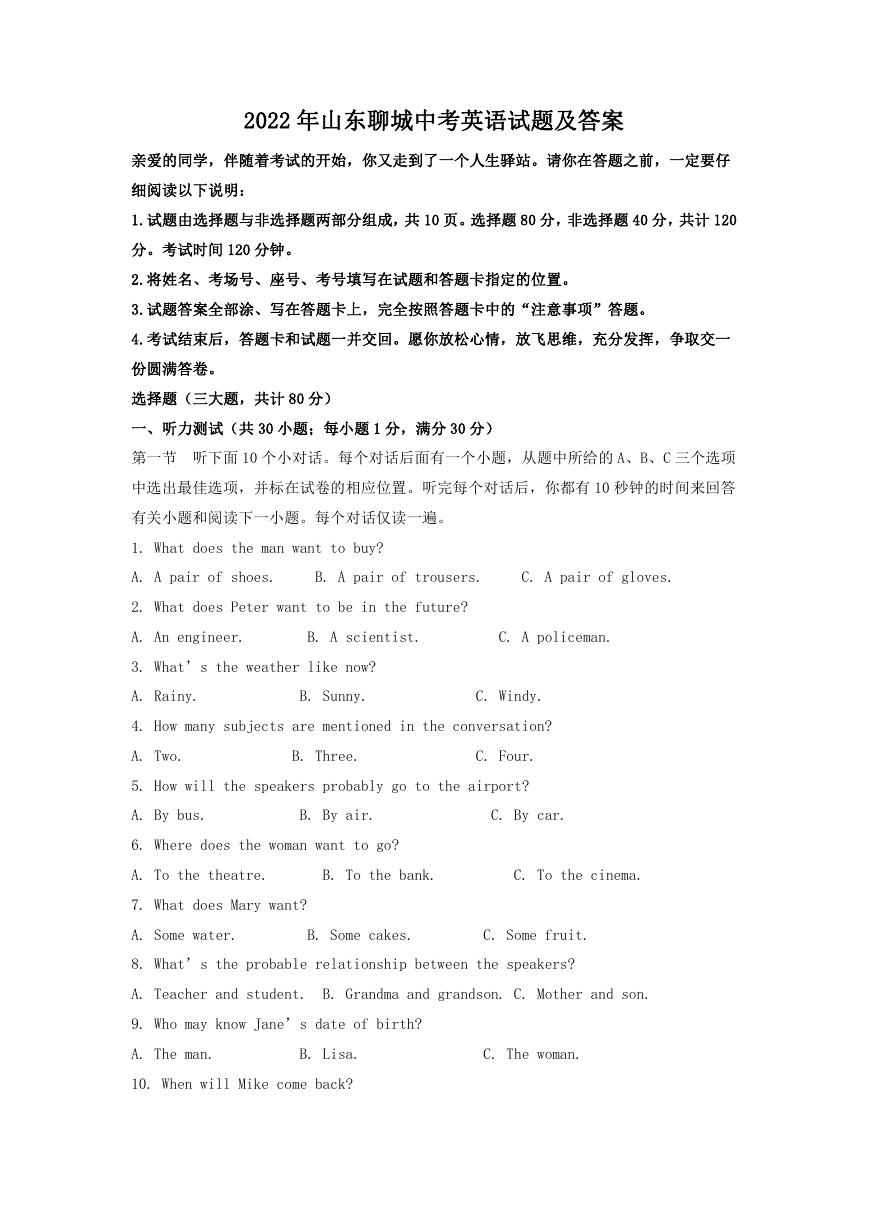
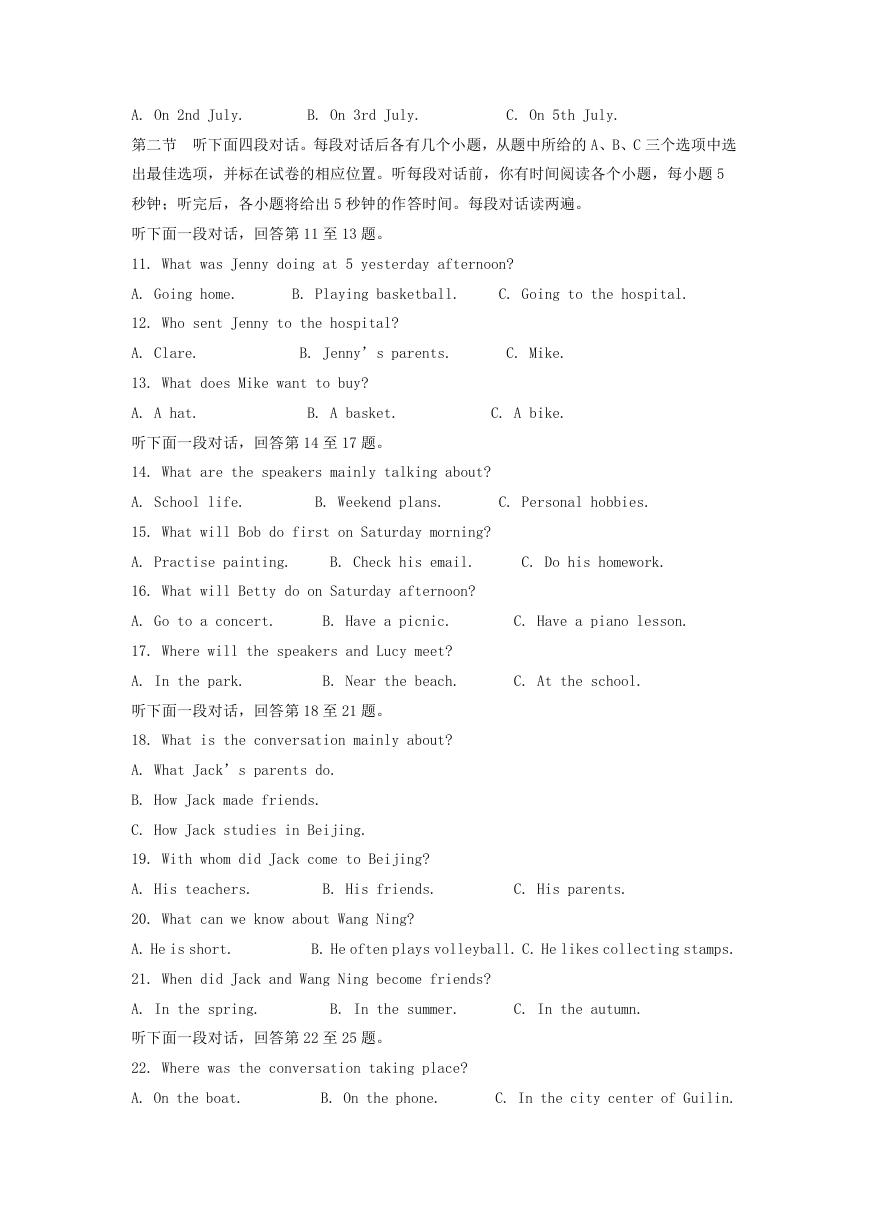
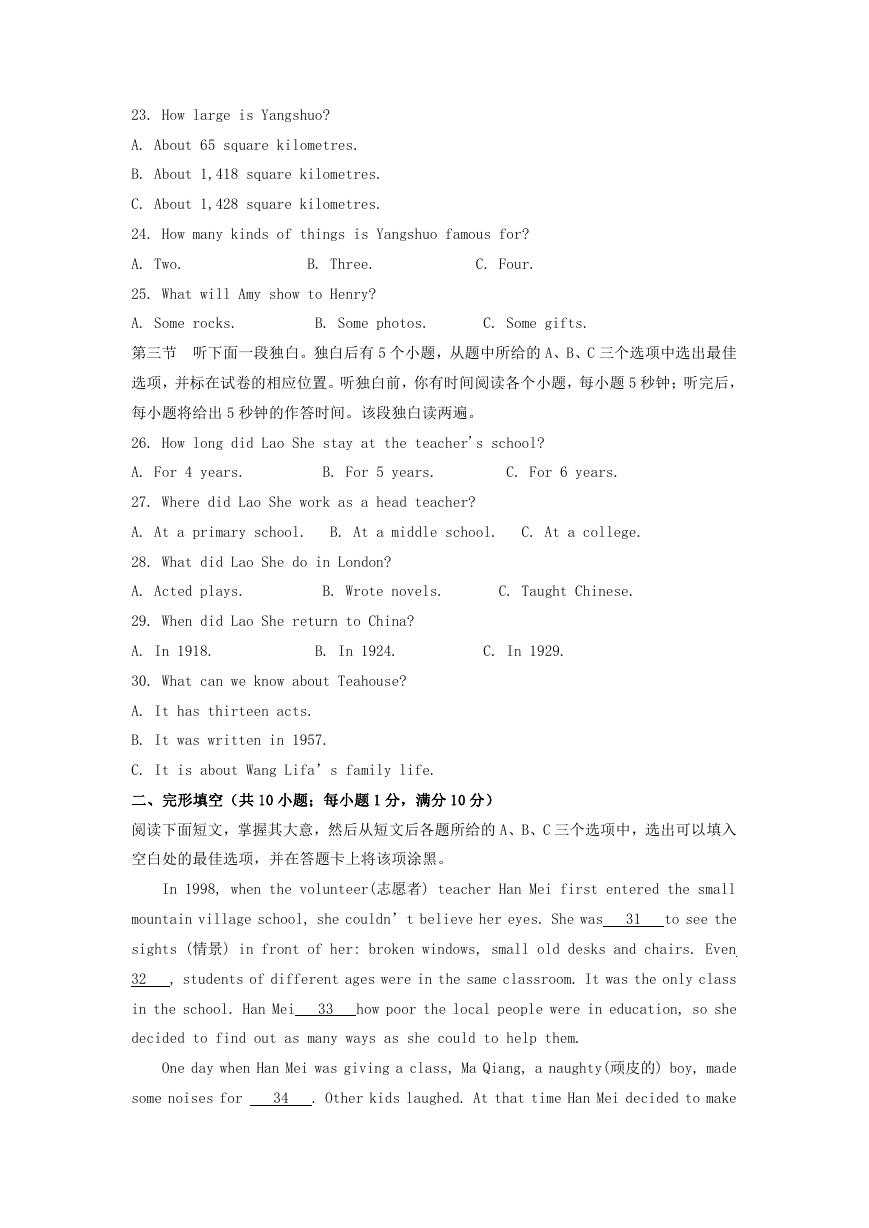

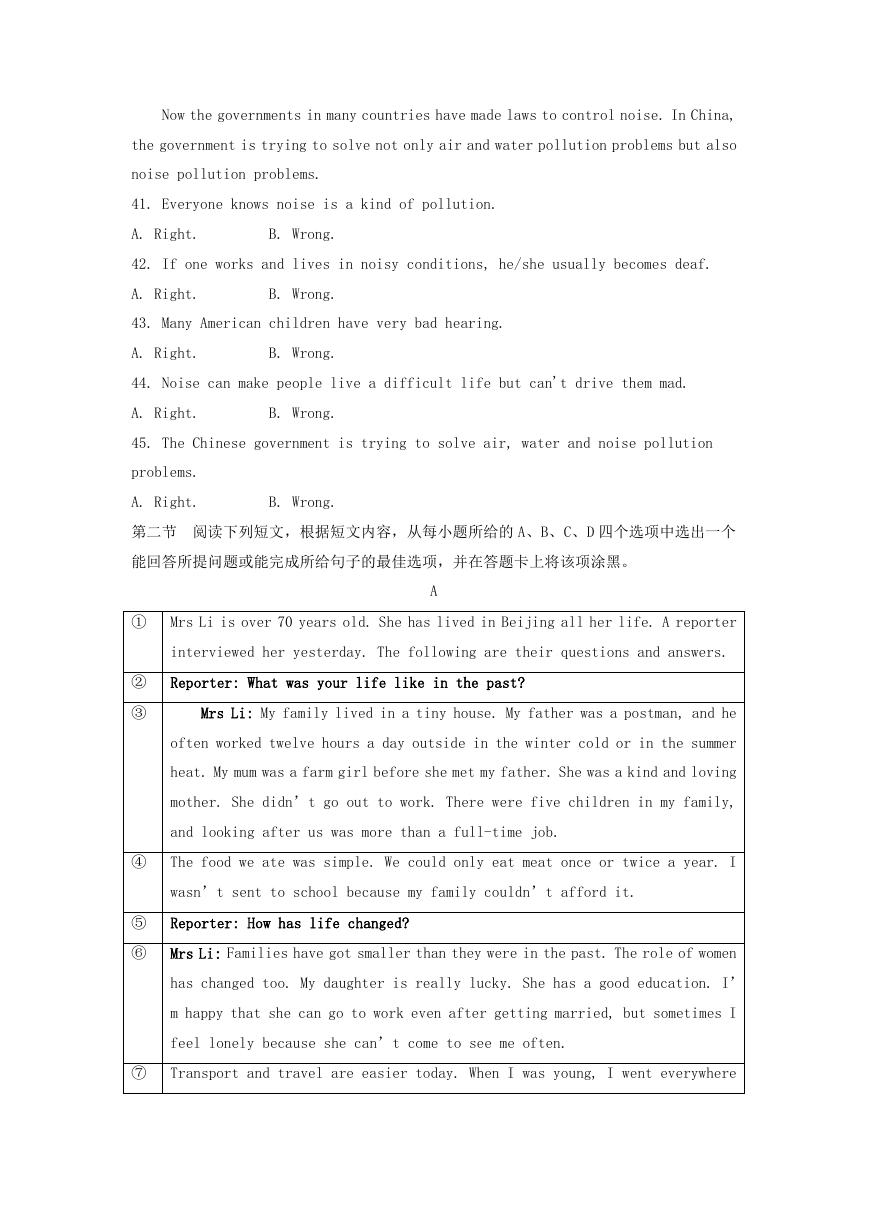
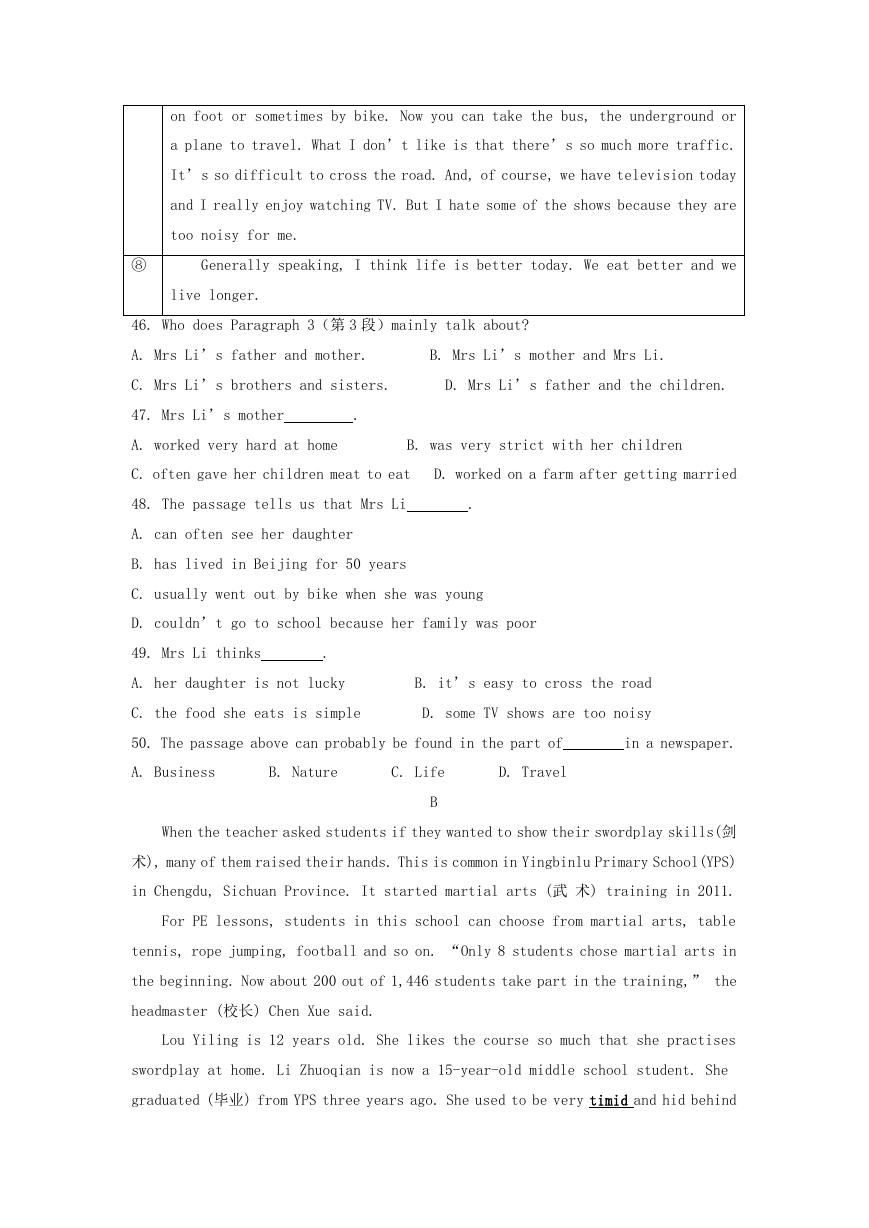
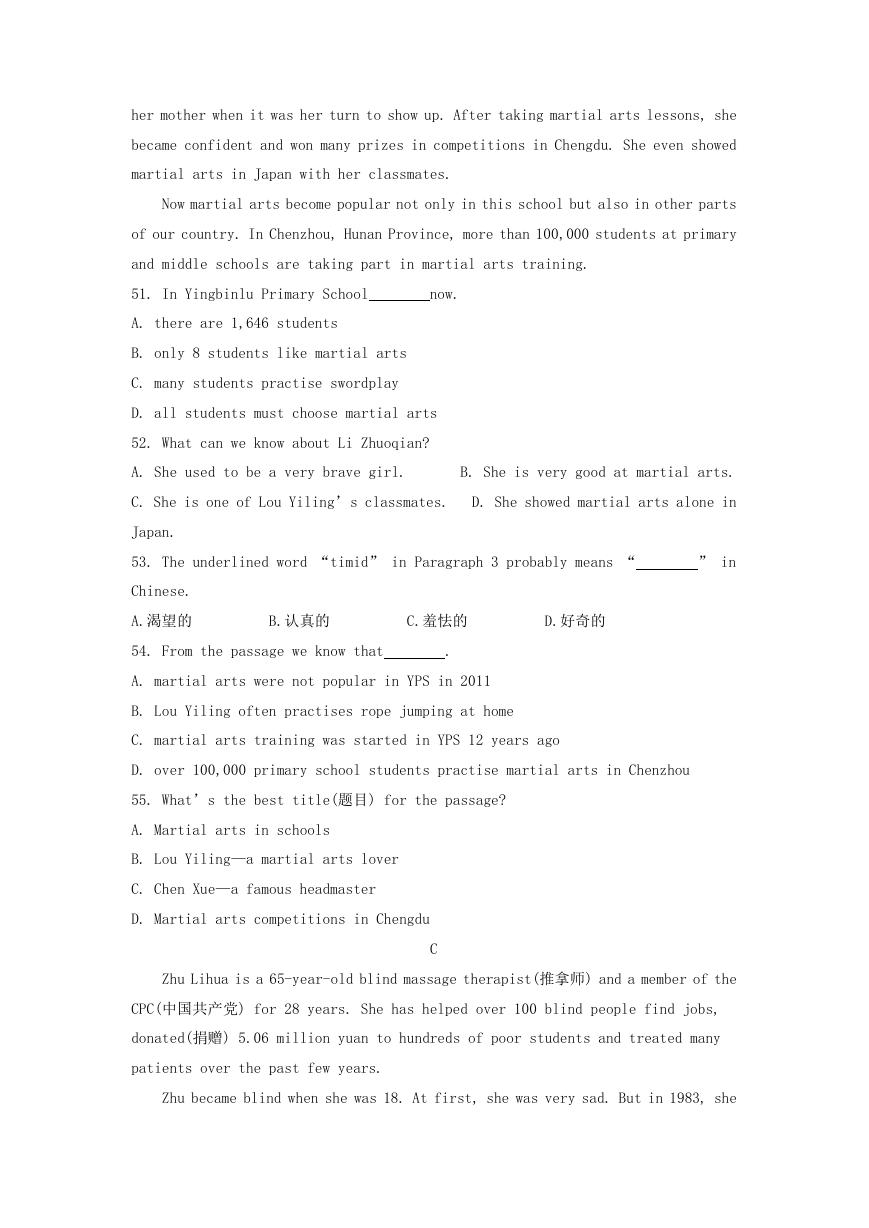
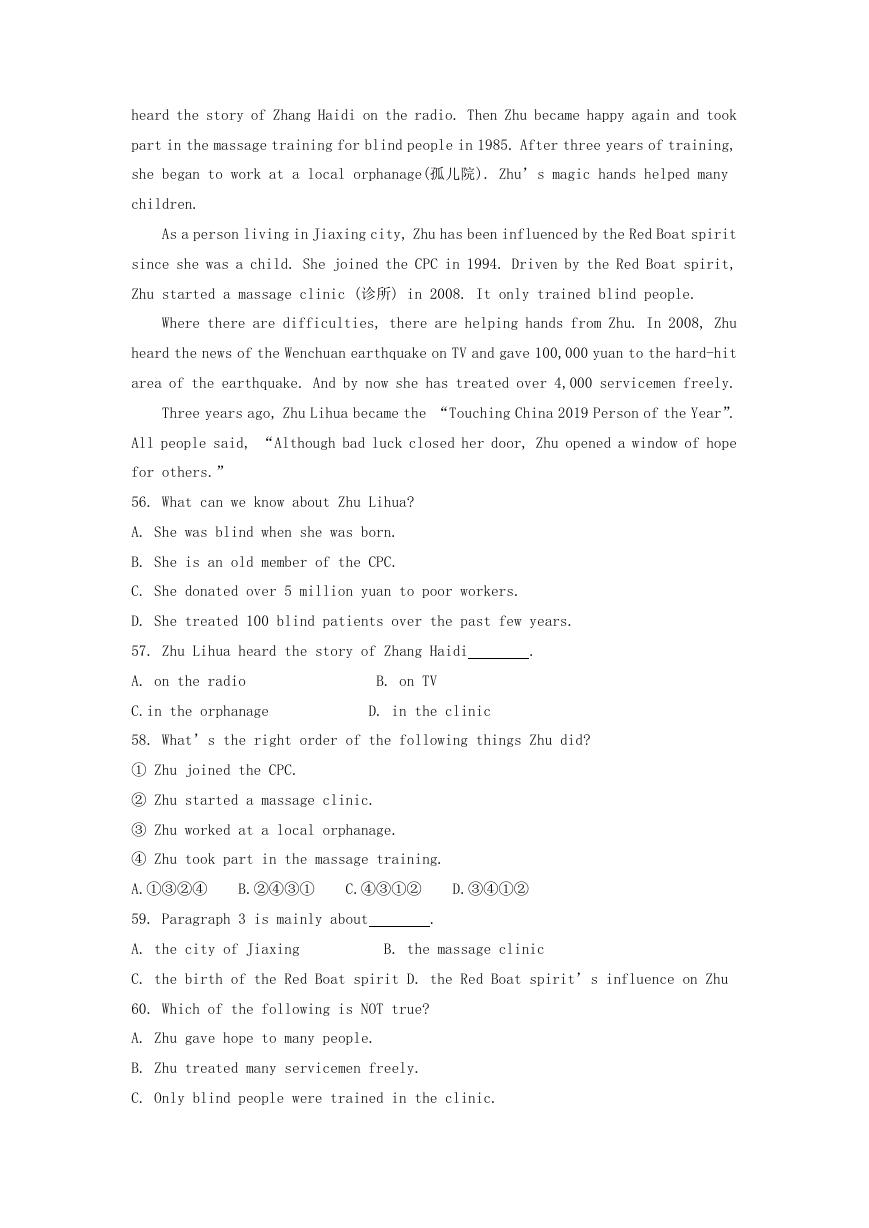








 2023年江西萍乡中考道德与法治真题及答案.doc
2023年江西萍乡中考道德与法治真题及答案.doc 2012年重庆南川中考生物真题及答案.doc
2012年重庆南川中考生物真题及答案.doc 2013年江西师范大学地理学综合及文艺理论基础考研真题.doc
2013年江西师范大学地理学综合及文艺理论基础考研真题.doc 2020年四川甘孜小升初语文真题及答案I卷.doc
2020年四川甘孜小升初语文真题及答案I卷.doc 2020年注册岩土工程师专业基础考试真题及答案.doc
2020年注册岩土工程师专业基础考试真题及答案.doc 2023-2024学年福建省厦门市九年级上学期数学月考试题及答案.doc
2023-2024学年福建省厦门市九年级上学期数学月考试题及答案.doc 2021-2022学年辽宁省沈阳市大东区九年级上学期语文期末试题及答案.doc
2021-2022学年辽宁省沈阳市大东区九年级上学期语文期末试题及答案.doc 2022-2023学年北京东城区初三第一学期物理期末试卷及答案.doc
2022-2023学年北京东城区初三第一学期物理期末试卷及答案.doc 2018上半年江西教师资格初中地理学科知识与教学能力真题及答案.doc
2018上半年江西教师资格初中地理学科知识与教学能力真题及答案.doc 2012年河北国家公务员申论考试真题及答案-省级.doc
2012年河北国家公务员申论考试真题及答案-省级.doc 2020-2021学年江苏省扬州市江都区邵樊片九年级上学期数学第一次质量检测试题及答案.doc
2020-2021学年江苏省扬州市江都区邵樊片九年级上学期数学第一次质量检测试题及答案.doc 2022下半年黑龙江教师资格证中学综合素质真题及答案.doc
2022下半年黑龙江教师资格证中学综合素质真题及答案.doc